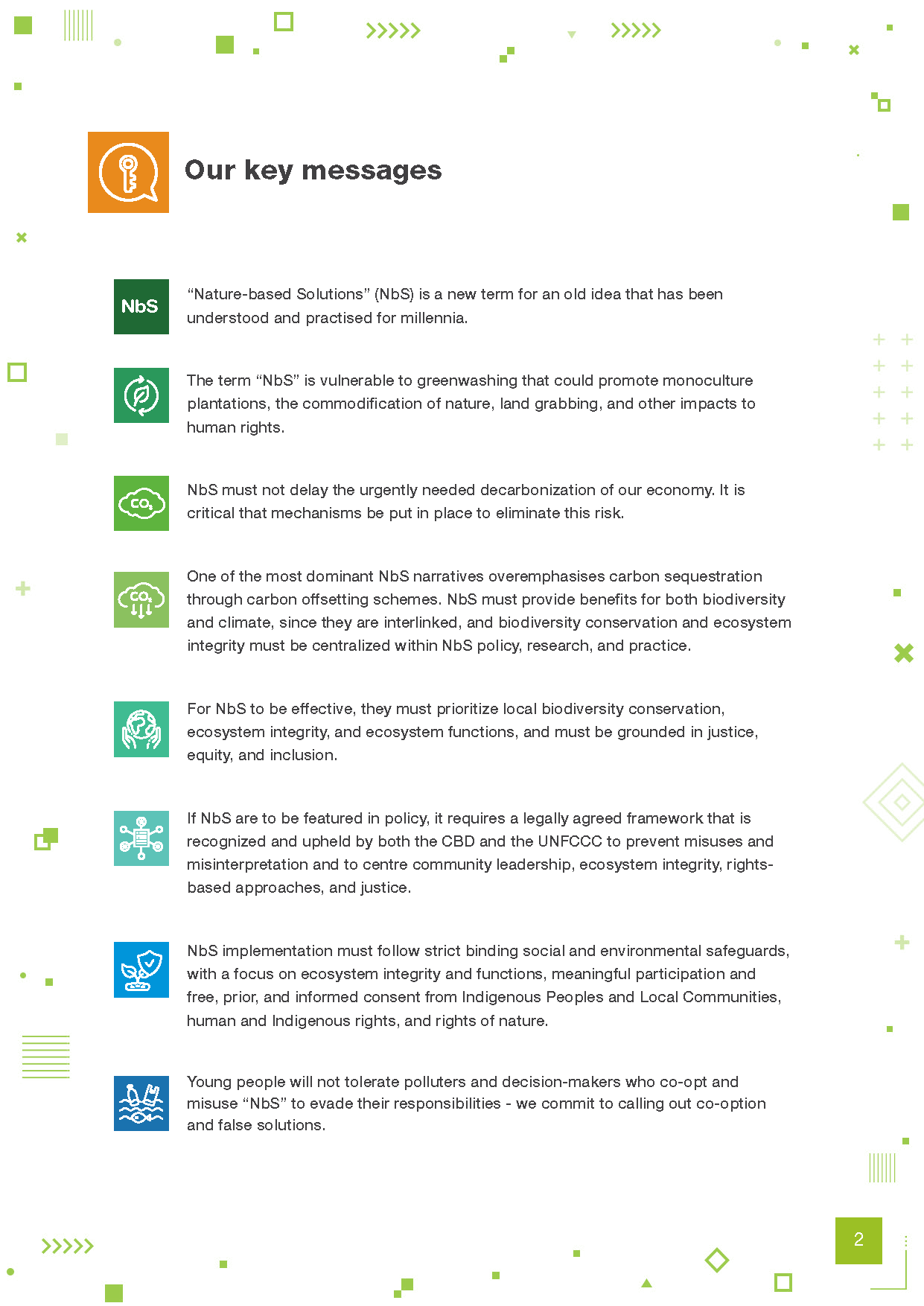It’s been two years since the historical Global Biodiversity Framework agreed at UN Biodiversity (CBD) COP15. We have seen growing momentum on Nature-based Solutions (NbS) and nature-climate synergies since then.
Following our blog ahead of COP15, and ahead of CBD COP16, UNFCCC COP29, and UNCCD COP16 taking place over the next few months, we would like to share our latest views on the NbS space with both optimism and concerns.
As a refresher, we – Global Youth Biodiversity Network (GYBN, CBD Youth Constituency), Youth4Nature and YOUNGO (UNFCCC Youth Constituency) came together in 2021 to form the NbS Youth Coalition. We shared our NbS policy brief, ran a survey with over 1,000 young people, and building on that, launched the Global Youth Position Statement on Nature-based Solutions, outlining the views and concerns of young people on the term NbS. We are proud to have worked with many youth-led initiatives, UN agencies and international organisations throughout our work.
Progress since 2021
Since our statement was launched in 2021, NbS has been more mainstream. Multiple UN negotiations included NbS on the agenda. At the UNEA-5, UNEP adopted the first multilateral definition for NbS with nature at the center of the concept, but without grounding it in justice, equity, and right-based approaches. At the UNFCCC COP27, NbS were included for the first time in a COP decision with consensus across all member states, which encouraged member states to consider the implementation of NbS as defined by UNEP. At CBD COP15, the Global Biodiversity Framework was adopted to guide biodiversity policy, where Targets 8 and 11 include NbS as a way to minimize the impacts of climate change, increase resilience and restore nature's contributions to people.
In 2023, The first Global Consultation on NbS kicked off as agreed to in the UNEA-5 resolution aiming to support the implementation of NbS worldwide. During this consultation, some participants expressed their concern that NbS might infringe on the rights of Indigenous Peoples and local communities, where the need for social and environmental safeguards was highlighted. Critics were also made about NbS being linked to low-integrity carbon or biodiversity offsets, setting an urgency on standards and guidelines to avoid greenwashing, as we highlighted in our Statement.
Nature Positive seems to have become the new buzzword. We remain worried, as GYBN has expressed, that certain private sector stakeholders and NGOs are advocating for this term without a widely adopted definition or safeguards.
Taking action on the ground
Policy progress can not be separated from on-the-ground implementation and local actions. We are extremely inspired by the actions and advocacy of young leaders worldwide. Youth play a crucial role in NbS implementation, acting as key drivers of restoration and conservation efforts. The INUKA AFRIKA project is a prime example of how youth are leading NbS projects across diverse ecosystems. INUKA supports youth-led initiatives through technical training, mentorship, and microgrants, enabling young leaders to address environmental challenges while improving community resilience.
For instance, the INUKA project has supported initiatives to restore degraded mangrove forests, improve agricultural lands through regenerative farming, adopt sustainable practices like Farmer-Managed Natural Regeneration, and enhance wetland conservation by growing correct indigenous species to regain lost biodiversity. These initiatives are not just about environmental restoration—they are also rights-based, focusing on inclusive approaches that empower youth, respect community knowledge, and ensure equitable benefits for local populations.
A key feature of INUKA’s rights-based approach is the integration of Indigenous knowledge and community involvement in project planning and execution. For example, the restoration of Ondiri Wetland involved youth working alongside community elders, ensuring that traditional land rights and community ownership were respected. By focusing on sustainable livelihoods and community participation, INUKA ensures that NbS projects not only restore ecosystems, but also uphold the rights and well-being of local communities, creating long-term social and environmental benefits.
Our ask
There is growing momentum in fostering synergies between the biodiversity and climate agendas. The three COPs of the Rio Conventions this year, as well as key events in 2025 like UNFCCC COP30, IUCN World Conservation Congress, and UNEA-7, present unique and critical opportunities for further progress.
Youth movements have always played a key role in promoting transformative change, ambitious and synergistic actions, as well as synchronising policies on biodiversity loss and climate change. However, many low-integrity climate decisions continue to threaten biodiversity and billions of livelihoods.
NbS will continue to play an important role in CBD and UNFCCC negotiations. NbS must follow human rights-based approaches. It is essential to apply strict and binding social and environmental safeguards as well as to advance detailed guidelines and clear mechanisms for implementation. We must ensure, under a precautionary approach, that no project that harms biodiversity integrity or denies human rights, including the rights of Indigenous peoples and local communities, will be financed or executed. FPIC processes, full and effective participation of rights-holders in decision-making processes, as well as the improvement of impact assessments in a holistic and inclusive way, are a must.
NbS is instrumental in advancing climate and nature actions. But there is no space for low-integrity NbS that delays the progress of decarbonization or opens doors to the use of non-proven or low-integrity afforestation, biomass, biofuels, monocultures, geoengineering, and offset initiatives as false solutions or greenwashing. Youth remain a cautionary voice, highlighting that despite the benefits of NbS, they can be used to justify harmful projects if misused. We need and only need NbS that truly puts people and nature at the center.
Authors: Youth4Nature (Ashik Iqbal, Cathy Yitong Li, Yuliana Rodriguez and Zuhura Ahmad) and Global Youth Biodiversity Network (Daniela Arredondo and Heitor Dellasta)




